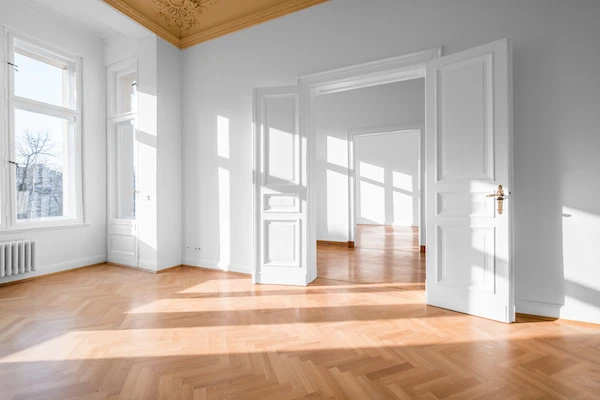
There are various circumstances under which a property might remain vacant, and regardless of the reason, ensuring adequate insurance coverage is paramount. Unforeseen events could jeopardise the value of your property and you may potentially lose all you’ve invested into it.
Here’s where vacant property insurance steps in, providing a safety net for your investment, and safeguarding you from financial setbacks should anything adverse occur.
Circumstances Leading to a Vacant Property
Here are a few common scenarios that might leave a property unoccupied:
- Inheritance: Following a property owner’s demise, their heirs may be unable or unwilling to immediately occupy the property, leaving it vacant until it’s eventually sold.
- Relocation: If you’re relocating abroad and are unable to sell your property before the move, the property will likely remain vacant until a buyer is found.
- In-between selling: Sometimes, you might need to vacate your property while it’s on the market to secure a new property and prevent losing it. This could leave your previous property vacant for an extended period.
- Renovation: Major construction work, like extensions, might necessitate moving out temporarily, leaving the property empty.
- Development Delays: For developers, acquiring a property for redevelopment is just the beginning. The approval process for development can be time-consuming, involving consultation with local councils and residents, adherence to building regulations, application for ‘Lawful Development Certificate,’ and dealing with potential restrictive covenants. This could leave the property vacant for several months.
The Role of Unoccupied Property Insurance
While it’s sometimes necessary to leave a property vacant, this comes with certain risks. Unexpected incidents could result in hefty repair costs, or worse, total loss of the property, like in the case of a fire.
Vacant property insurance is designed to provide financial protection during such situations. It covers a wide array of potential issues ranging from water damage, fires, theft, to vandalism. With this policy, you can enjoy peace of mind knowing your property is covered. The insurance compensates for any repairs or replacements needed, up to your chosen cover limit. Optional extras like lost rent or alternative accommodation costs can be added if your property becomes uninhabitable.
With this type of insurance, your investment is safeguarded against a host of risks, emphasising its importance in ensuring you aren’t financially burdened when things go wrong.
Considerations for Choosing Vacant Property Insurance

Keep in mind that vacant property insurance typically costs more than standard home insurance due to the perceived higher risk. Here are a few aspects to consider when obtaining vacant property insurance:
- Coverage period: Most insurers offer cover for a limited time, usually between 30 to 60 days. If your property will be unoccupied for longer, seek an insurer who can provide extended coverage.
- Declare your plans: Be upfront with your insurer about your intentions for the property, whether minor changes or major alterations, and whether you plan to sell or rent it out. Failing to do so could complicate claims.
- Extent of cover needed: Ensure your policy covers all potential issues and offers different levels of coverage to suit your needs. Failure to do this might result in denied or partially covered claims.
Types of Coverage for Empty Properties
Your property is a valuable asset, and the right insurance to protect it while vacant is crucial. Whether vacant during renovations or for extended periods, various policies are available based on your needs.
Basic policies offer FLEEA cover for fire, lightning, earthquake, explosion, or aircraft damage. More comprehensive options include coverage for subsidence and water damage. For complete protection, a ‘full perils’ policy covers all possible issues without exclusions.
Additional insurance like loss of rent cover and building insurance can be obtained if you plan to rent out your property after renovation. Regardless of your needs, there’s an insurance policy to protect your property and satisfy your requirements.
Vacant property insurance is indispensable for protecting your investment. Though it may cost more than standard insurance, the peace of mind it provides is worth the extra expense. If your property is likely to remain vacant for any duration, ensure you obtain the right coverage and policy to meet your needs.
Unoccupied Property Insurance for Developers

If you’re a developer leaving your property vacant for a period, it’s crucial to arrange suitable cover to protect your investment. This could result in substantial financial savings in the long run.
That’s where Construction Insure comes in. As specialist insurance brokers with significant industry experience, we know what coverage you need and will match you with an insurer who protects your risk. We can also connect you with insurers who offer policy cancellation on short notice, preventing a year-long commitment.
We understand the significance of a developer’s investment. That’s why we offer insurance policies to shield your investment while the property is vacant, regardless of whether it’s awaiting planning permission, under renovation, or on the market for an extended period.
Our expert team will partner with you as a developer to find the most suitable insurance cover for your vacant properties, ensuring your investment is secure.
Contact us today to learn more about our specialist vacant property insurance coverage.
